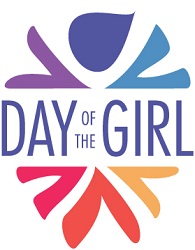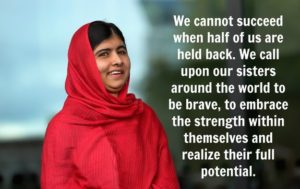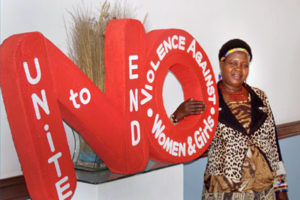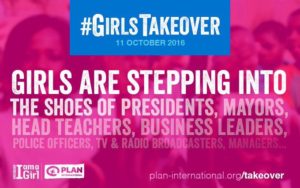
In 2011, the UN declared the 11th of October as the International Day of the Girl, to empower girls and to acknowledge the discrimination and inequality girls face on a global, and staggering, scale.
The theme for the 2016 International Day of the Girl is Girls’ Progress = Goals’ Progress: A Global Girl Data Movement. As girls make up roughly half of the world population, if girls aren’t achieving their potential, the entire world isn’t. When girls are educated, the whole world benefits. UNESCO’s Institute of Statistics has found that 32 million primary school aged girls are still out of school, 98 million without a secondary education, and 130 million never going to school at all. The Sustainable Development Goals, also a focus of 2016’s theme, includes a goal to alter, and by 2030, eradicate, gender inequality.
To celebrate the International Day of the Girl, we’re recognising 7 incredible, inspirational girls and women that have made big stands since the last 11th of October.
Malala Yousafzai
 A celebration of progression towards the Sustainable Development Goals in 2015/16 would be impossible without mentioning Malala. The end of 2015 saw the release of the immensely popular film sharing her story He Named Me Malala, spreading her active campaigning with projects such as #YesAllGirls, amplifying girls’ voices all over the work. Malala is a phenomenal advocate of girls rights to education and equality.
A celebration of progression towards the Sustainable Development Goals in 2015/16 would be impossible without mentioning Malala. The end of 2015 saw the release of the immensely popular film sharing her story He Named Me Malala, spreading her active campaigning with projects such as #YesAllGirls, amplifying girls’ voices all over the work. Malala is a phenomenal advocate of girls rights to education and equality.
Chief Theresa Kachindamoto
 Another horrific inequality girls face is forced marriages, especially of young children. The forced marriage of young girls is likely to end any education they were previously in. In Malawi, one in every two girls under 18 was already married, often legally. Through lobbying by the UN, the legal age for marriage in Malawi was raised to 18, leading to the annulment of 330 marriages, sending out a clear message for a desperate need for a change in inequality.
Another horrific inequality girls face is forced marriages, especially of young children. The forced marriage of young girls is likely to end any education they were previously in. In Malawi, one in every two girls under 18 was already married, often legally. Through lobbying by the UN, the legal age for marriage in Malawi was raised to 18, leading to the annulment of 330 marriages, sending out a clear message for a desperate need for a change in inequality.
Laura Bates
The founder of the Everyday Sexism Project has released a second book this year, Girl Up, a 10-step guide for survival for girls and young women. Girl Up is an exploration and critique of the daily and persistent inequalities western girls face, from body image to sexting. “If a young woman is confronted with a sexual image from a male and asked to send one back, most adults would simply advise ‘well don’t send a picture back, then’.” But Bates says it is more complex and wanted something that would fill this void.
Marley Dias
Marley Dias is the creator of #1000BlackGirlBooks. At 11 years old, Marley was frustrated black girls like herself weren’t represented in the books she was reading, so she started a book drive to get 1000 books that represented black girl culture into libraries and schools. “It was the desire to see black girls and our experiences in the books that I was given to read at school that forced me to speak my truth.” Marley is now creating a Zine, #marleymag for Elle Magazine.
Tanya Burr
Tanya Burr, of blogging and YouTube fame, has utilized her enormous influence to be an advocate of the fifth of the Sustainable Development Goals, gender equality. Through her blog and a YouTube video that explains her advocacy for the project, Tanya shared the message of the #GlobalGoals to an enormous audience that might otherwise have not been reached. “We’re a generation that can truly make a positive impact on our world and I believe that change starts with improving the lives of girls and women.”
Anna Landre
Another inequality that damages girls disproportionately to their male counterparts is ableism. In light of Kylie Jenner’s questionable wheelchair photoshoot, Anna Landre wrote for Womensenews.org,
Another stereotype of disabled women is that we’re confined by our disability to being passive and unattractive. This was underscored only a few months ago when model Kylie Jenner posed for an Interview magazine photo shoot in a wheelchair, using it as a prop for her costume. Jenner explained the decision as a symbolic means of showcasing her apparent “limits” as a pop culture star, a complete misunderstanding of a piece of medical equipment that fosters freedom of mobility for those who need it.
Emma Watson
In 2014, Emma Watson gave a powerfully moving and influential speech to the UN addressing the He For She campaign, which recognizes that gender inequality affects us all. Emma has been tireless in advocating this movement, even interviewing Malala Yousafzai in 2016.
I’m inviting you to step forward, to be seen, and to ask yourself…If not me who? If not now, when?
-Emma Watson, Actor and UN Women Global Goodwill Ambassador

The global neglect of girls’ human rights doesn’t impact only girls: it impacts the whole world. Girls’ Progress = Goals’ Progress is an acknowledgment of how important gender equality, the fifth goal of the Sustainable Development Goals, is. To find out what you can do, there are many projects, from Girls not Brides to He For She, available here. Additionally, check out our 2016 Girls in Museum podcast, in celebration of the International Day of the Girl.
-Chloe Turner
Junior Girl
Girl Museum Inc.
